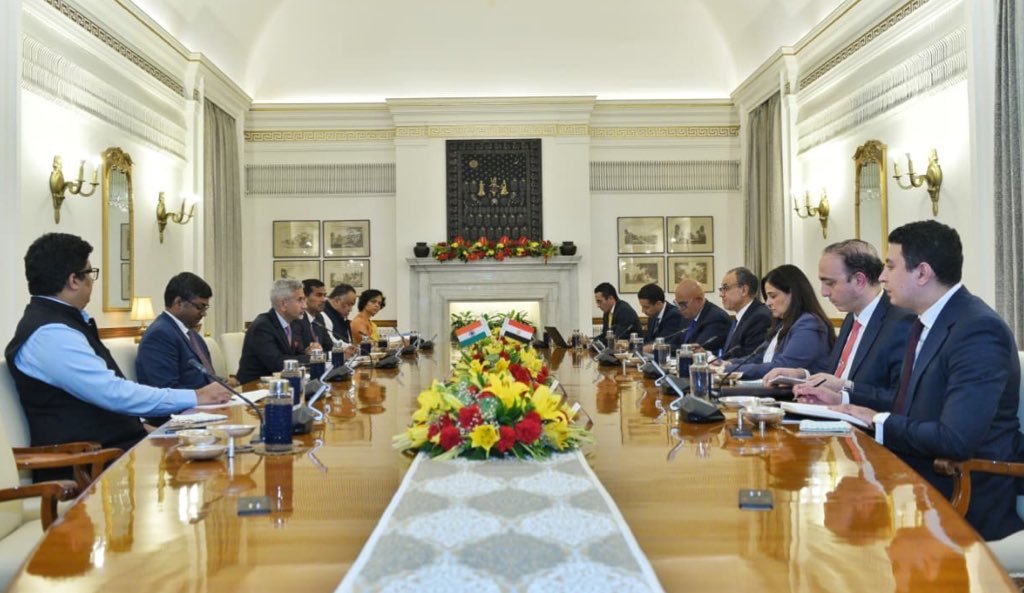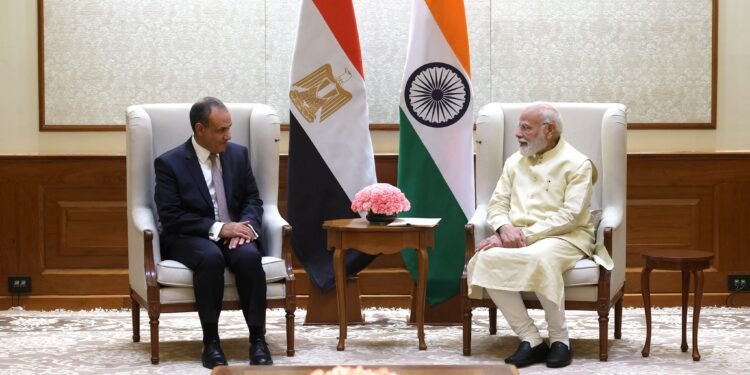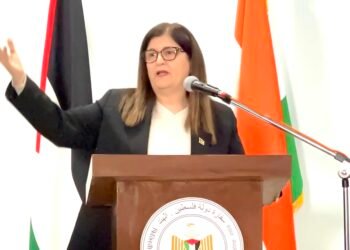NEW DELHI: During his recent visit to India, Egypt’s Foreign Minister Badr Abdelatty delivered a message that resonates far beyond diplomatic niceties. While the two nations engaged in discussions on trade, investment, and technology, Abdelatty underscored that political stability in the Middle East, particularly the resolution of the Palestinian issue is critical to enabling transformative regional projects like the India–Middle East–Europe Economic Corridor (IMEC).
The corridor, a U.S.-backed initiative announced at the G20 Summit in September 2023, aims to connect India to Europe through the United Arab Emirates, Saudi Arabia, Jordan, and Israel, combining sea and rail routes to facilitate trade, investment, and industrial growth.
Abdelatty’s visit coincided with the inaugural India–Egypt Strategic Dialogue, marking the first ministerial-level engagement of its kind between the two countries. The dialogue reflected the strategic ambition of both nations to elevate their partnership to a new level, building on the 2023 agreement between President Sisi and Prime Minister Modi.
The discussions were broad, encompassing political, economic, and technological cooperation, defense, counterterrorism, and regional security concerns. Abdelatty described the engagement as historic and fruitful, emphasizing that both nations are committed to operationalizing the strategic partnership through concrete projects and investment flows.
While political symbolism is important, Abdelatty’s remarks made it clear that the economic dimension of the partnership cannot flourish in isolation from the realities of regional conflict. He stressed, “Connectivity is very important as part of a final settlement of the Palestinian cause. The IMEC is an important project, but peace and justice must come first.”
The minister’s words were a reminder that mega infrastructure and trade projects, no matter how ambitious, are inextricably linked to political stability. Without a durable resolution to the Palestinian question and a stabilized Gaza, corridors intended to span continents risk being disrupted, undermining both economic and diplomatic objectives.

In addition to geopolitical considerations, Abdelatty highlighted the tangible economic costs that instability has imposed on Egypt. The Red Sea, a vital artery of global commerce, has been repeatedly targeted by Houthi rebels aligned with Iran, claiming to act in solidarity with Palestinians.
The result has been a severe disruption in shipping through the Suez Canal, with daily crossings declining from 75 to between 25 and 50, causing estimated losses exceeding $9 billion. For a nation dependent on the Canal for revenue and for global trade, the fallout has been profound. These developments underscore the fragility of regional economic networks and the necessity of combining diplomatic engagement with security measures to protect infrastructure and trade.
Abdelatty also emphasized the urgency of deepening India–Egypt economic cooperation. Currently, around 55 Indian companies operate in Egypt, but the minister urged a significant expansion, highlighting sectors ranging from chemicals, fertilizers, pharmaceuticals, food security, and the automotive industry to cutting-edge areas such as artificial intelligence, digitalization, Industry 4.0, renewable energy, green hydrogen, and green ammonia production. He portrayed India as a rising strategic partner capable of helping Egypt achieve its industrial and technological ambitions while also contributing to regional stability and multipolar development.
The dialogue also addressed cooperation in defense, counterterrorism, and capacity-building, reflecting the multidimensional nature of the strategic partnership. Both nations agreed to intensify high-level visits, with Dr. S. Jaishankar expected in Egypt in early 2026. Abdelatty framed these exchanges not merely as ceremonial, but as essential for strengthening ties across trade, investment, and political engagement. Beyond bilateral concerns, they also discussed international issues including Gaza, Sudan, Libya, Syria, Lebanon, and South Asia, underscoring the shared strategic vision of both nations.
On the sensitive question of Gaza, Abdelatty welcomed India’s participation in the historic Sharm El-Sheikh summit, which aimed to commemorate efforts to end hostilities and initiate reconstruction. He called for a UN Security Council resolution to authorize an international stabilization force in Gaza, alongside support for a structured Palestinian security apparatus to govern and rebuild the territory. For Egypt, ensuring peace and governance in Gaza is not a peripheral concern—it is central to enabling regional projects like the IMEC to function, allowing trade and infrastructure to flourish across borders.
Abdelatty’s visit and his statements highlight a crucial insight for global policymakers and investors: economic corridors cannot outrun geopolitics. Ambitious infrastructure projects require not only capital and technology but also strategic foresight and sustained diplomacy. As Egypt demonstrates, the success of projects such as IMEC depends equally on resolving political conflicts, stabilizing regional hotspots, and ensuring security for commerce and industry.
For India, the strategic dialogue with Egypt represents a significant opportunity to expand influence and economic engagement in the Middle East and North Africa while demonstrating a commitment to regional stability. The proposed Indian industrial zone along the Suez Canal Economic Zone symbolizes this vision: it merges investment, industrial modernization, and geopolitical strategy, allowing India and Egypt to shape a shared agenda for development and security.
Ultimately, Egypt’s message is clear: true regional connectivity, whether through the IMEC or other initiatives, cannot be achieved without addressing the political and humanitarian realities that shape the Middle East. By linking peace in Palestine with trade, investment, and technological collaboration, Egypt is positioning itself as a central broker in the region, while inviting India to become a strategic partner in shaping a stable, prosperous, and multipolar global order. As Abdelatty put it, “India is a rising strategic partner. Our cooperation from trade to technology and peace to prosperity will help shape a more balanced global order.”
In a world increasingly defined by economic interdependence and geopolitical volatility, Egypt’s approach offers a lesson: connectivity, commerce, and peace are inseparable, and projects that fail to account for the political landscape are destined to falter. For India and Egypt, the path forward is clear: align strategic partnership with a commitment to peace, and the promise of regional integration will finally be realized.
— Dr. Shahid Siddiqui | Follow on X @shahidsiddiqui



















